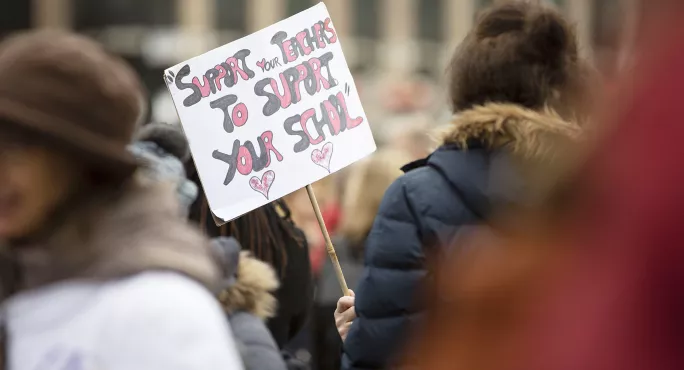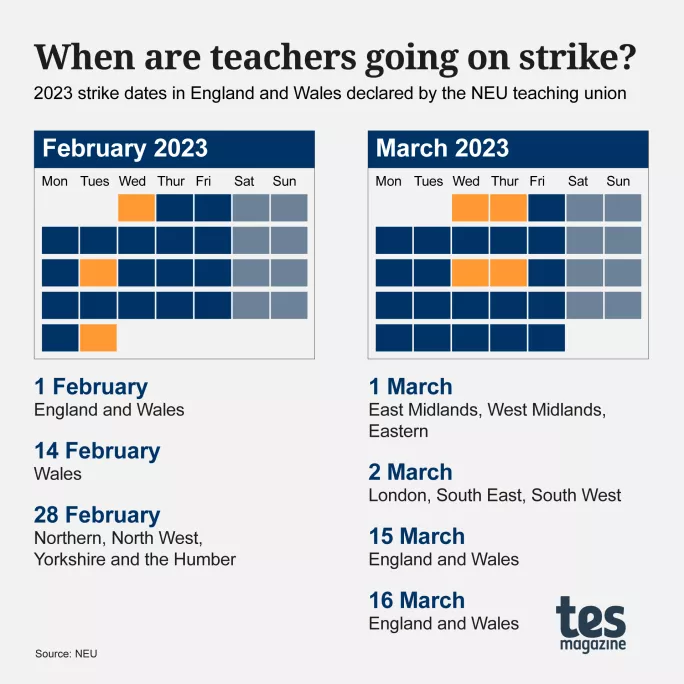Teacher strikes: What school leaders need to know

School leaders are currently preparing for a series of day-long teacher strikes, kicking off with a national walkout next Wednesday (1 February).
Here are answers to some of the burning questions leaders have been asking as they prepare for the first nationwide teacher strikes in seven years.

1. Do teachers have to tell heads they are striking?
Employers are entitled to ask employees if they will be striking; however, teachers do not have to provide an answer and the law is clear that they should not be pressured to do so.
Some teachers will be willing to inform leaders of their intentions next Wednesday, but others will prefer to keep this information private.
2. What about non-union members who want to strike - when do they need to notify the head?
Under the law, teachers who are not members of any union will be able to take part in industrial action next Wednesday and be protected from unfair dismissal.
Like NEU teacher members, teachers who are not members of the NEU or any other union are not obliged to tell leaders that they intend to strike, but leaders are still entitled to ask.
However, it is important that if you do ask staff and begin to keep a record, it is important to keep in mind that trade union membership is sensitive data and should be stored in a secure way.
Teachers who are members of other unions cannot take part in the strikes and be protected from unfair dismissal protections.
3. Does the NEU have to tell schools the total number of members striking?
Schools will be informed either directly by the NEU or through their multi-academy trust of the number and description of members the NEU is calling on to take action in each workplace.
However, the NEU does not have to provide the names of individual members to the employer.
- Teacher strikes: NEU attacks Keegan ‘fishing expedition’
- Support staff: Don’t cover teacher colleagues on strike, TAs told
- Inspection: Ofsted will not inspect schools on strike days
4. Is there a deadline and can that number change afterwards?
Under strike laws, unions have to inform employers of the intention to strike 14 days before.
But the NEU has said that due to so many new members joining in the past week (22,000 and rising), in many workplaces there will now be more NEU teacher members than when it sent notice to employers.
5. Do schools have to report their strike plans to the government?
While schools have been contacted by the government requesting information about their “anticipated operational status” on 1 February, the action is voluntary and schools do not have to provide this information.
In fact, Paul Whiteman, general secretary of the NAHT, said it was ”highly unlikely that leaders will, at this stage, be able to say with confidence how the strike action will affect their schools next week” and that the DfE request was “non-statutory”.
6. What are the rules for teachers who have joined the NEU to strike since the ballot results were announced?
Even if teachers become members after a strike ballot has been conducted, all eligible members (in this case teacher members) can take part in strike action if that union has a mandate.
You do not have to have voted in a ballot to take strike action and be protected by employment laws.
7. Are support staff such as teaching assistants included in the industrial action?
Support staff including teaching assistants did not reach the legal turnout threshold in a ballot on strike action. They therefore shouldn’t be striking as they don’t have the lawful right to strike and it would therefore be a breach of their employment contract.
If support staff do choose to strike, it would be classed as absent without leave; however, how far heads take disciplinary action, if any, is a personal management decision.
8. Can heads merge classes to keep schools open if they have non-striking staff to cover them?
Yes, heads can merge classes to keep schools open.
9. Can heads get TAs to cover classes for striking staff?
Polly O’Malley, partner and employment law specialist at law firm Stone King, tells Tes that the ”general position” is that TAs “can be asked to provide cover, but the extent of that cover will largely depend on their level and the provisions of their contract. For example, the contract may specifically prohibit carrying out particular duties”.
She continues: “More senior TAs have cover supervision as part of their job description, which includes setting and supervising work provided by a qualified teacher, but junior TAs may not be required to supervise the whole class.
“TAs should not be required to carry out teacher duties unsupervised, but within this framework there are many other duties that they can provide to assist in covering during the strike.”
10. Can heads force staff to cover classes?
Ms O’Malley says headteachers “can ask members of staff, including the senior leadership team, to cover for striking teachers, but much will depend on the nature of the request, whether it is a reasonable management instruction and the contractual status of the employee”.
“If staff members are covered by the school teachers’ pay and conditions document (STPCD), they cannot be compelled to cover for other teachers who are striking,” she explains.
All teachers directly employed by maintained schools in England are covered by the STPCD in their contracts.
11. If the school is pre-emptively closed on strike days but staff turn up for work, could they still claim pay?
The short answer is yes. If staff show up for work, they are entitled to get paid.
However, Browne Jacobson LLP lawyers say that if someone is passionate enough that they want to strike, they’re going to strike - and it is unlikely that someone who wants to strike then won’t.
You need a Tes subscription to read this article
Subscribe now to read this article and get other subscriber-only content:
- Unlimited access to all Tes magazine content
- Exclusive subscriber-only stories
- Award-winning email newsletters
Already a subscriber? Log in
You need a subscription to read this article
Subscribe now to read this article and get other subscriber-only content, including:
- Unlimited access to all Tes magazine content
- Exclusive subscriber-only stories
- Award-winning email newsletters
topics in this article



